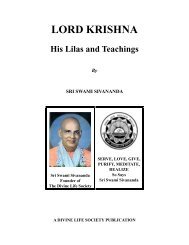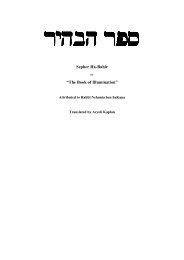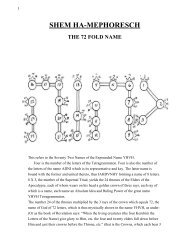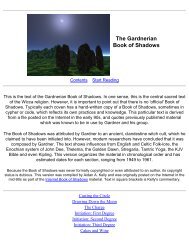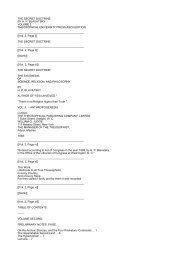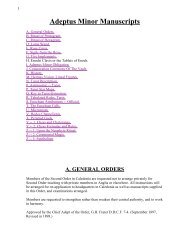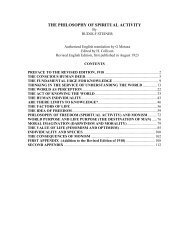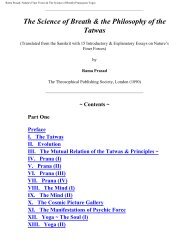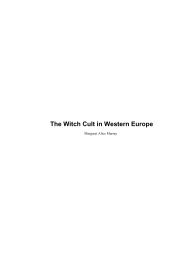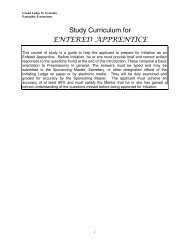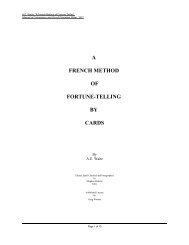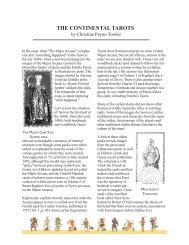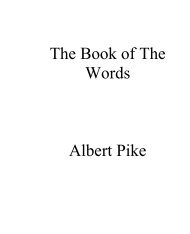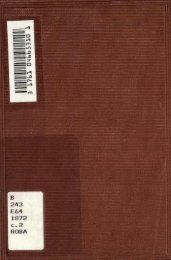You also want an ePaper? Increase the reach of your titles
YUMPU automatically turns print PDFs into web optimized ePapers that Google loves.
The Doctrine Of Eternal Life.<br />
d'Archéologie, t. i., pp. 93-114; Devéria, L'Expression Màà-xerou (in Recueil de Travaux, t. i., p. 10 ff.). A somewhat<br />
different view <strong>of</strong> <strong>the</strong> signification <strong>of</strong> maakheru is given by Virey (Tombeau de Rekhmara, Paris, 1889, p. 101. Published in<br />
Mémoires publiés par les Membres de la Miss. Arch. Française au Caire, t. v., fasc. i.). The <strong>of</strong>ferings which were painted<br />
on <strong>the</strong> walls <strong>of</strong> <strong>the</strong> tomb were actually enjoyed by <strong>the</strong> deceased in his new state <strong>of</strong> being. The Egyptians called <strong>the</strong>m "per<br />
kheru," that is to say, "<strong>the</strong> things which <strong>the</strong> word or <strong>the</strong> demand made to appear," or "per hru kheru," that is to say, "<strong>the</strong><br />
things which presented <strong>the</strong>mselves at <strong>the</strong> word" or "at <strong>the</strong> demand" <strong>of</strong> <strong>the</strong> deceased. The deceased was <strong>the</strong>n called "maa<br />
kheru," that is to say, "he who realizes his word," or "he who realizes while he speaks," or "whose voice or demand<br />
realizes," or "whose voice or demand makes true, or makes to be really and actually" that which only appears in painting<br />
on <strong>the</strong> walls <strong>of</strong> <strong>the</strong> tomb. M. Amélineau combats this interpretation, and agrees with M. Maspero's rendering <strong>of</strong> "juste de<br />
voix"; see Un Tombeau Égyptien (in Revue de l'Histoire des Religions), t. xxiii, pp. 153, 154. It is possible that maa-kheru<br />
may mean simply "blessed."]<br />
{p. 1xxv}<br />
and his ka is triumphant.[1] He sits on a great throne by <strong>the</strong> side <strong>of</strong> God.[2] The throne is <strong>of</strong> iron<br />
ornamented with lions' faces and having <strong>the</strong> ho<strong>of</strong>s <strong>of</strong> bulls.[3] He is clo<strong>the</strong>d in <strong>the</strong> finest raiment, like<br />
unto <strong>the</strong> raiment <strong>of</strong> those who sit on <strong>the</strong> throne <strong>of</strong> living right and truth.[4] He receives <strong>the</strong> urerit crown<br />
from <strong>the</strong> gods,[5] and from <strong>the</strong> great company <strong>of</strong> <strong>the</strong> gods <strong>of</strong> Annu.[6] He thirsts not, nor hungers, nor is<br />
sad;[7] he eats <strong>the</strong> bread <strong>of</strong> Ra and drinks what he drinks daily,[8] and his bread also is that which is<br />
spoken by Seb, and that which comes forth from <strong>the</strong> mouth <strong>of</strong> <strong>the</strong> gods.[9] He eats what <strong>the</strong> gods eat, he<br />
drinks what <strong>the</strong>y drink, he lives as <strong>the</strong>y live, and he dwells where <strong>the</strong>y dwell;[10] all <strong>the</strong> gods give him<br />
<strong>the</strong>ir food that he may not die.[11] Not only does he eat and drink <strong>of</strong> <strong>the</strong>ir food, but he wears <strong>the</strong><br />
[1. Recueil de Travaux, t. v., p. 189 (l. 179).<br />
2. ###. Ibid., t. i,., p. 58 (l. 494).<br />
3 ###. Ibid., t. vii., p. 154 (ll. 309, 310).<br />
4. Ibid., t. v., p. 148 (1. 239).<br />
5. Ibid., t. iv., p. 56 (l. 480).<br />
6. Ibid., t. v., p. 176 (1. 117).<br />
7. Ibid., t. iii., p. 195 (l. 172).<br />
8 Ibid., t. v., p. 52 (l. 335)<br />
9 ###. Ibid., t. iii., p. 208 (1. 234).<br />
10. Ibid., t. iii., p. 198 (1. 191 f.).<br />
11. Ibid., t. v., p. 164 (1. 56).]<br />
{p. lxxvi}<br />
apparel which <strong>the</strong>y wear,[1] <strong>the</strong> white linen and sandals;[2] he is clo<strong>the</strong>d in white,[3] and "he goeth to <strong>the</strong><br />
great lake in <strong>the</strong> midst <strong>of</strong> <strong>the</strong> Field <strong>of</strong> Peace whereon <strong>the</strong> great gods sit; and <strong>the</strong>se great and never failing<br />
gods give unto him [to eat] <strong>of</strong> <strong>the</strong> tree <strong>of</strong> life <strong>of</strong> which <strong>the</strong>y <strong>the</strong>mselves do eat that he likewise may<br />
live."[4] The bread which he eats never decays and his beer never grows stale.[5] He eats <strong>of</strong> <strong>the</strong> "bread <strong>of</strong><br />
eternity" and drinks <strong>of</strong> <strong>the</strong> "beer <strong>of</strong> everlastingness" which <strong>the</strong> gods eat and drink;[6] and he nourishes<br />
himself upon that bread which <strong>the</strong> Eye <strong>of</strong> Horus has shed upon <strong>the</strong> branches <strong>of</strong> <strong>the</strong> olive tree.[7] He<br />
suffers nei<strong>the</strong>r hunger nor thirst like <strong>the</strong> gods Shu and Tefnut, for he is filled with <strong>the</strong> bread <strong>of</strong> wheat <strong>of</strong><br />
which Horus himself has eaten; and <strong>the</strong> four children <strong>of</strong> Horus, Hapi, Tuamautef, Qebhsennuf and<br />
http://www.sacred-texts.com/egy/ebod/ebod05.htm (16 <strong>of</strong> 21) [8/10/2001 11:23:21 AM]



